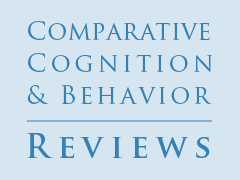Information Seeking in Animals: Metacognition?
by William A. Roberts,
University of Western Ontario
Neil McMillan,
University of Western Ontario
Evanya Musolino,
University of Western Ontario
Mark Cole,
University of Western Ontario
Reading Options:
Download/Read PDF | Add to Endnote
Abstract
Metacognition refers to humans’ ability to monitor the state of their own learning and to judge the correctness of information retrieved from memory. Inferences about metacognition-like processes in non-human animals have been made from studies in which subjects judge the adequacy of previously presented information and from information seeking studies in which no prior knowledge exists. This article briefly reviews the former type of experiments but focuses on studies of information seeking. A number of studies now indicate that apes and monkeys will look down opaque tubes or under opaque containers to see the location of a hidden reward. They less often make looking responses when other information indicates the location of reward, such as visible baiting, transparent tubes or containers, or logical inference. Studies of information seeking in pigeons, rats, and dogs are reported that indicate they do not readily show the types of looking responses seen in primates. If given a forced choice between stimuli that do and do not yield information about the location of reward, however, these non-primates make the informative choice. It is suggested that the choice of information in these pigeon, rat, and dog experiments may be a form of secondary sign-tracking and thus different from the metacognition-like processes used by primates.
Keywords: comparative cognition, information seeking, metacognition, observing response, sign tracking
Roberts, W. A., McMillan, N., Musolino, E., & Cole, M. (2012). Information Seeking in Animals: Metacognition? Comparative Cognition & Behavior Reviews, 7, 85-109. Retrieved from https://comparative-cognition-and-behavior-reviews.org/ doi:10.3819/ccbr.2012.70005
